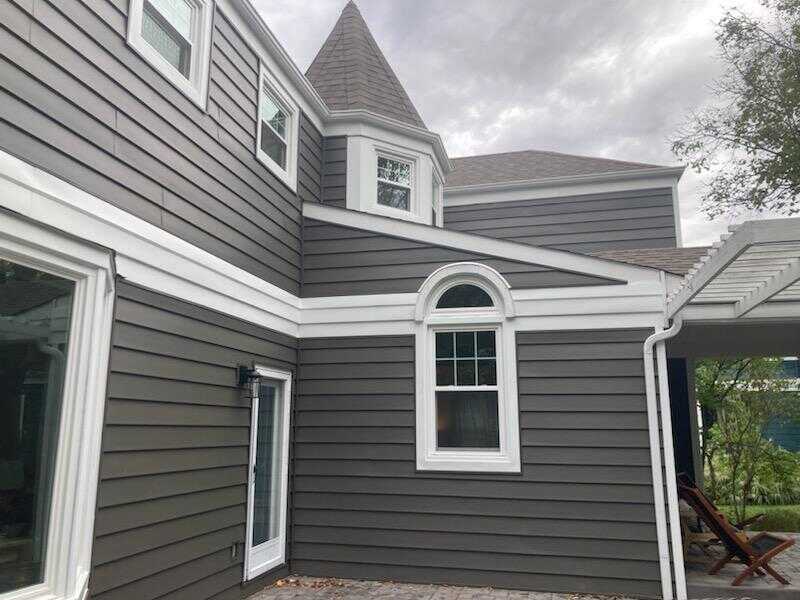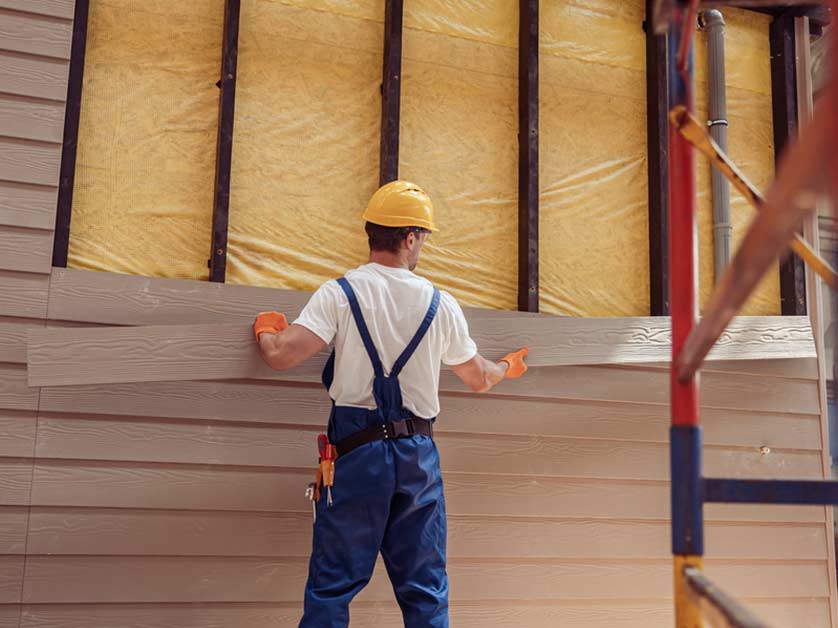Professional Morris Siding Contractor Offering Quick and Efficient Service
The Important Overview to the Various Sorts Of Siding and Their Special Benefits
In the realm of home renovation, picking the appropriate house siding is a crucial decision that affects both aesthetic allure and useful efficiency. With so several choices to take into consideration, which exterior siding material absolutely stands out for your details task?
Wood Exterior Siding
Wood siding, a preferred selection for property exteriors, offers a classic visual that integrates natural elegance with architectural integrity. This siding material is available in various styles, consisting of clapboard, roof shingles, and board-and-batten, allowing home owners to customize their façade to match their design choices. Wood siding is commonly crafted from long lasting types such as cedar, redwood, or yearn, which are recognized for their durability and capacity to stand up to environmental stress factors.
One of the key benefits of timber exterior siding is its excellent insulation residential or commercial properties, which can add to energy efficiency and lower home heating costs. In addition, wood home siding is naturally degradable, making it an environmentally friendly alternative when sourced sustainably. Regular upkeep, consisting of paint or staining, can extend its lifespan and enhance its appearance, permitting property owners to maintain the natural charm of the wood.
However, potential disadvantages consist of susceptibility to bugs, rot, and climate damage, requiring adequate treatment and upkeep - morris siding contractor. Regardless of these concerns, when appropriately looked after, wood home siding can give a stunning and sturdy option that boosts the character of a home while providing a cozy, welcoming ambience

Plastic Home Siding
Vinyl house siding has become a leading option for house owners seeking a low-maintenance outside option that incorporates toughness and affordability. This functional material is crafted from polyvinyl chloride (PVC), making it immune to various climate condition, consisting of moisture and UV rays. Therefore, vinyl house siding does not warp, rot, or fade, making certain lasting visual appeal.
One of the key benefits of plastic exterior siding is its considerable range of shades and designs, permitting property owners to accomplish the wanted search for their residential property without the need for frequent repainting. Furthermore, plastic siding is simple to set up, which can significantly decrease labor prices throughout construction or restoration tasks.
Plastic siding also adds to power efficiency. Numerous choices function insulation support, which improves thermal efficiency, helping to maintain comfortable indoor temperatures and possibly decreasing power bills. Its smooth surface promotes very easy cleansing, calling for just regular washing with a garden hose to get rid of dirt and debris.
Fiber Concrete Siding
Fiber cement siding has actually gained grip amongst homeowners and contractors alike because of its impressive mix of longevity and visual adaptability. Composed of a mixture of cellulose, cement, and sand fibers, this house siding choice is crafted to withstand severe climate condition, consisting of high winds, hefty rain, and temperature level changes, making it a resilient option for residential outsides.

One of the key benefits of fiber concrete exterior siding is its resistance to pests, such as termites, and its non-combustible nature, offering improved fire safety and security. morris siding contractor. Furthermore, it is readily available in a broad selection of structures, styles, and colors, allowing home owners to achieve their preferred visual without sacrificing performance
One more benefit is its low upkeep requirements; fiber cement house siding usually calls for painting or discoloration every 5-10 years, which is much less constant than other materials. Moreover, its long life adds to a lower total expense of ownership, as it minimizes the requirement for constant repairs or substitutes.
Ultimately, fiber cement exterior siding represents an exceptional financial investment for those seeking a durable, appealing, and flexible outside choice, integrating both type and feature to improve the home's visual charm.
Steel Home Siding
The appeal of metal home siding depends on its robust toughness and contemporary visual charm, making it a favored choice for he said modern design. Readily available in materials such as aluminum and steel, metal house siding supplies an array of colors and coatings, permitting home owners read here to accomplish an individualized look that complements their design vision.

Energy efficiency is another significant advantage, as many steel siding products are developed with insulation options that help regulate indoor temperatures. This can lead to decreased energy costs in time. Additionally, steel house siding is often recyclable, making it an eco-friendly choice for sustainability-minded homeowners.
The installment procedure for steel exterior siding can be relatively straightforward, leading to a quicker turnaround time for construction projects. On the whole, steel home siding integrates functionality and design, making it a sensible alternative for those looking for a visually enticing and long-lasting exterior coating.
Block and Stone Siding
Block and stone siding attracts attention as an ageless choice that boosts the aesthetic beauty of any type of home. Known for their resilience and reduced maintenance, these products offer an outstanding return on financial investment while raising the residential property's curb allure. Offered in resource numerous colors, appearances, and patterns, brick and stone can be customized to fit varied architectural designs, from traditional to contemporary.
One of the main benefits of block and stone home siding is their energy effectiveness. Both products have all-natural protecting homes that aid control interior temperature levels, potentially decreasing heating & cooling prices. Additionally, they provide remarkable fire resistance contrasted to various other exterior siding alternatives, adding to enhanced security.
One more benefit is their durability. Block and rock can last for years, frequently requiring very little upkeep past periodic cleansing. Unlike timber home siding, they are resistant to pests and rot, guaranteeing a resilient outside that holds up against the components.
Verdict
In recap, the option of house siding significantly impacts a home's aesthetic appeal, energy efficiency, and upkeep needs. Each sort of house siding-- whether timber, vinyl, fiber block, cement, or metal and rock-- supplies one-of-a-kind advantages customized to numerous homeowner choices and ecological conditions. Comprehending these choices enables educated choices that improve both the toughness and visual charm of household outsides. Inevitably, selecting the right house siding is crucial for accomplishing a balance in between performance and design in residential style.
One of the key benefits of timber exterior siding is its superb insulation residential properties, which can contribute to power efficiency and lower home heating costs. Furthermore, timber siding is biodegradable, making it an eco pleasant option when sourced sustainably.One of the key benefits of metal home siding is its resistance to various environmental aspects.Power efficiency is one more substantial benefit, as many metal home siding items are designed with insulation choices that aid manage indoor temperatures. Each type of exterior siding-- whether timber, plastic, fiber brick, metal, or cement and stone-- provides special advantages tailored to various property owner preferences and environmental conditions.